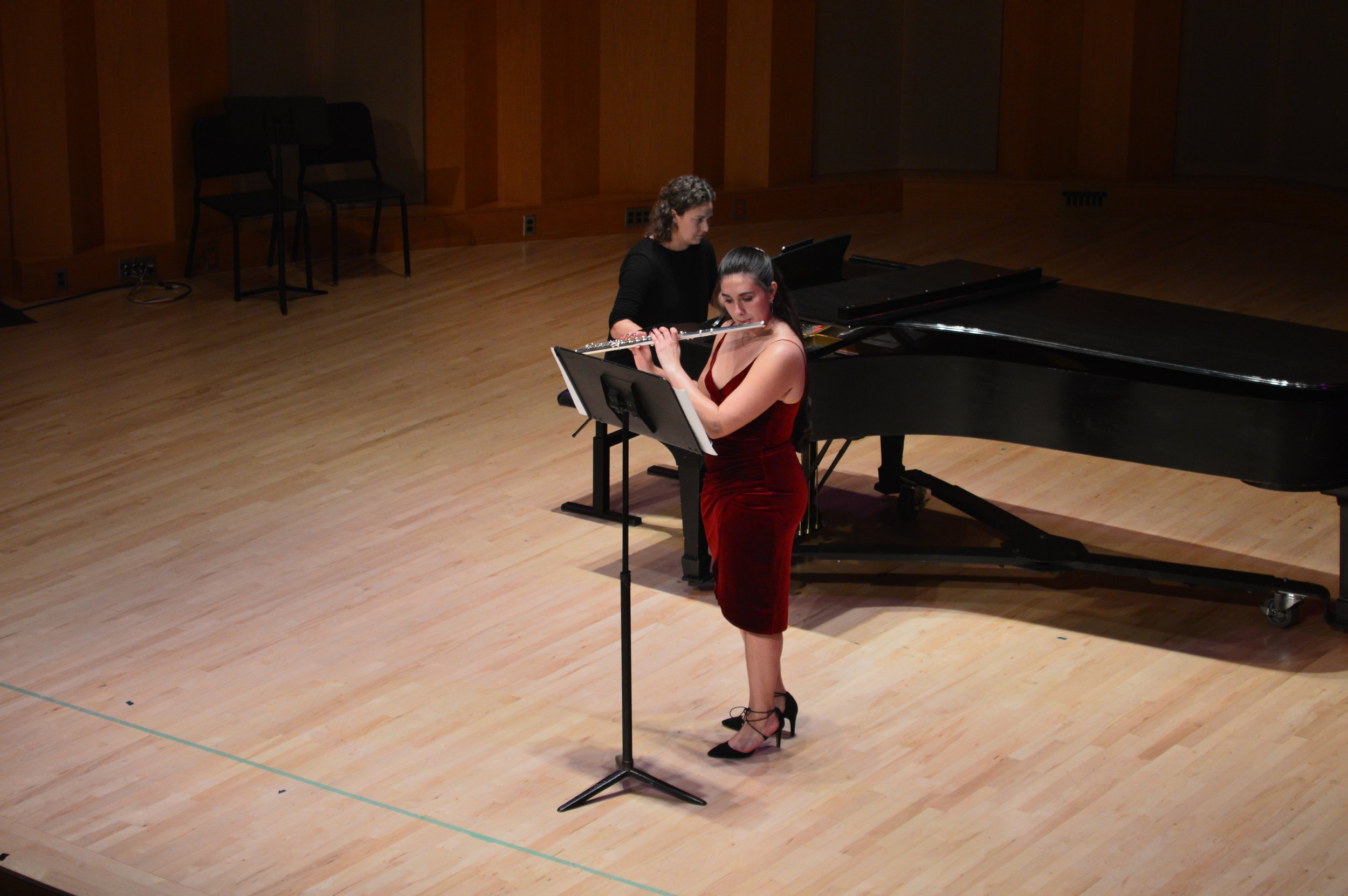When Words Fail, Music Speaks
Image by Noah Beardslee
Emylla Salinas walked on the stage of Weber Music Hall wearing high-heeled shoes, a red velvet dress and a flute in her hand. The room was dark except for the stage. Salinas raised the instrument to her lips and music rang out and filled the room.
For her first song of the night, “Soate Pour Flute et Piano” by Francis Poulec, Salinas was joined by pianist Jessica Schroeder. Graceful trills featured heavily in the song and Salinas jumped from low notes to high notes with precision. Smooth measures were swiftly punctuated by up-beat flourishes. Once the performers concluded the playful piece they both left the stage.
Salinas began playing flute in 7th grade and continued through high school. In addition to a bachelor’s degree in accounting, she took on a second major in music. The senior recital performed 13 Nov. was the culmination of Salinas’ years of work.
Held at the end of both fall and spring semesters, the recital is a requirement she and other music majors must perform to complete the degree. These recitals can be attended for free, the details of which can be found on hallway flyers and by scrolling through the University of Minnesota Duluth campus events page.
The title of Salinas’ senior recital was “When words fail, music speaks.” The quote makes up the stem of a rose tattooed on her back, which was featured on posters promoting the recital.
“When you’re in a rough patch you can listen to music and bring you out of it,” she said. “Whenever you hear music or play music there’s always a feeling that comes with it. You always feel something emotional, you know, either relief or you feel sad or something like that and that’s kind of just what spoke to me through that quote, it’s just it’s true.”
Salinas was guided by her feelings when selecting the songs she performed, and the selection of music by students is important to Paula Gudmundson, associate professor of flute at UMD. “Having them be an active participant and selecting the music is really important because otherwise they’re not going to be really invested,” Gudmundson said.
Salinas walked back on stage, this time with two student volunteers: cellist Gretta Heinecke and pianist Katherine Shmelev. Once the trio took their positions, they began to play “Trio Op. 63” by C.M. Von Weber. Throughout the piece they executed powerful crescendos and even created suspense with the silent rests.
The three musicians left the stage followed by the return of Salinas with Schroder to perform “Fantasie” by Georges Hue. Gudmundson described the piece as improvisatory and evocative and even went as far as to call it the most challenging song of the night.
“This piece was brand new to her, but she really took it on. I mean, it’s also very technically challenging.” Gudmundson said, adding that although many other people would be intimidated and overwhelmed by such a challenging song, “she wasn’t scared to play something technical … that was a piece she really wanted to play.”
Salinas, when asked if she agreed that “Fantasie” was the most challenging song, responded “yes” followed by a short laugh, conveying in tone the struggle she surmounted. “It’s really hard to put together with the piano because if you get off, you’re just off and at that point you need to just keep going and eventually the pianist will find you somewhere,” she said.
She went on to describe the various tasks involved, from coordinating breath to articulation to fingering, all while thinking, “try to count, try to stay in time, try to be with the piano,” she said. “It took a lot of practice.”
But as Gudmundson said, “the flute is an instrument that shows off. I mean, everything we do is about being virtuosic and … sort of showing off what the flute can do.” That’s just what Salinas did. On stage, the flute — piano pair played in such a way that seemed like communication: a call and response between the two instruments. The song evoked feelings of wonder, sneaking and suspense.
The final song of the night, the theme of which Salinas based all her other selections, was “Hypnosis” by Ian Clarke. With long notes she demonstrated skilled breath control. The tone of the piece was at times somber and at times inspiring.
She performed and executed “like a dream” according to Gudmundson, adding that she performed everything as rehearsed and practiced, “And that’s the best you can hope for.”
Salinas agrees that the recital went well, but the end of this semester is also the end of her college career. “I’m kind of sad,” she said. Salinas explained how the music world in college is filled with practices, ensembles and playing with different groups, all of which is fun for her. “Then I came in the semester like, ‘this is the last time that I will be able to do this.’ Because then once you’re off in the world you have your full time job and, you know, maybe it is music, maybe it’s not.”
After winter break, Salinas has a spring internship with CliftonLarsonAllen, an accounting firm in Madison, Wisconsin, which she hopes will turn into a full-time job. Regardless, music is part of her plan as she intends on auditioning for local bands or even possibly offering music lessons.
She took a bow and left the stage to be greeted by her family, friends and a future full of possibilities.

